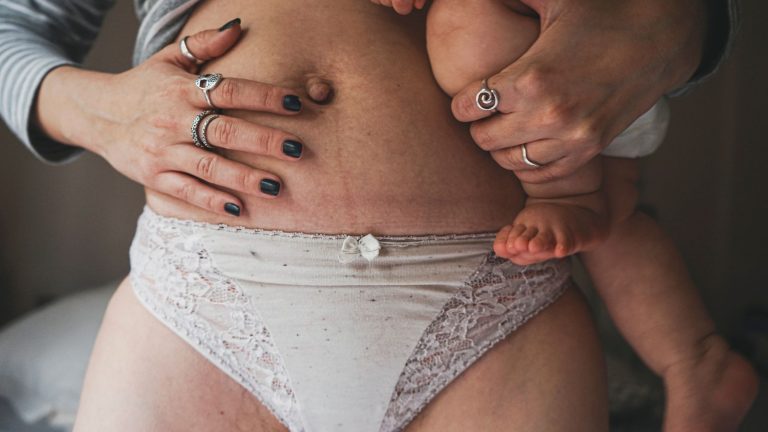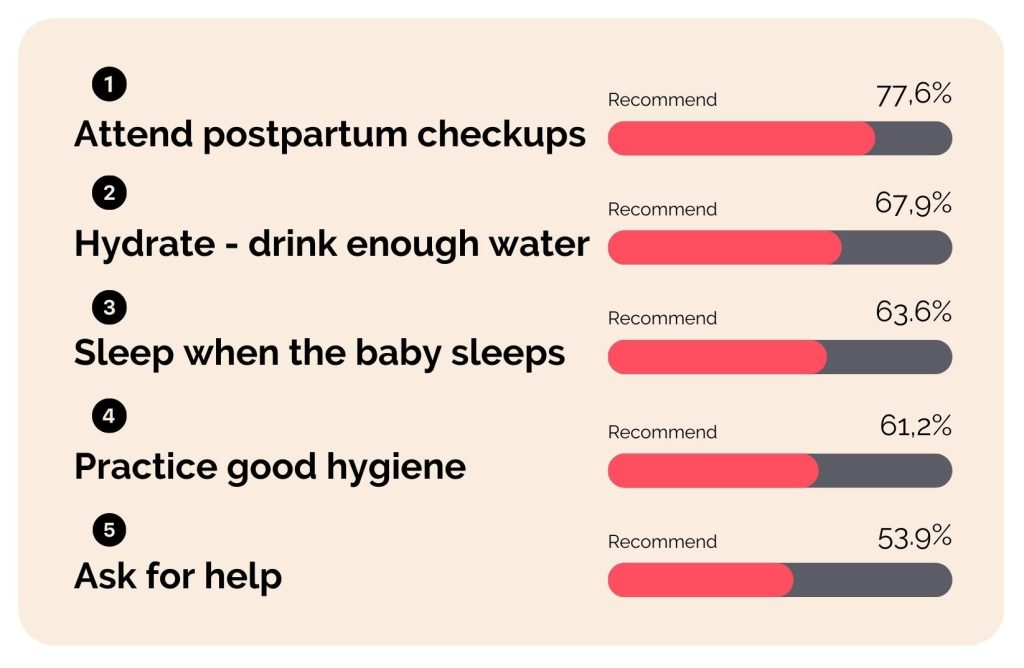
Navigating the Fourth Trimester: A Guide to Postpartum Care For Mom
- Created:
4. 4. 2023 - Updated:
15. 2. 2024
The truth is:
After giving birth, the mother’s body is faced with many changes that can be challenging and exhausting.
Hence:
Mums must care for themselves to ensure a faster and more effective recovery and reduce the risk of complications.
In this article:
We’ll focus on a few key areas of postnatal care for mothers and share advice from real mums.
Postpartum Care For Mom
Healthy postpartum care helps mothers and newborns recover well and reduces the risk of complications. Postpartum is full of change and challenges, both physically and emotionally. Mothers need rest, a healthy diet, and self-care. After childbirth, wound care, hydration, and emotional support from family and loved ones are essential.
Postpartum Care For Mom: How Did You Care For Your Body After Giving Birth?
Our survey asked mothers how they cared for themselves after giving birth.
Therefore:
We can give you the answer and recommendations directly from the moms.
Let’s see what moms advise!

Attend Postpartum Checkups
Attending postpartum check-ups is important to monitor the mother and baby’s health, ensure prevention and early detection of potential complications, and provide professional support and information regarding the new role of the mother and breastfeeding.
Regular visits to a doctor or midwife can also help prevent and resolve mental health problems.
Drink Enough Water
Drinking enough water after labour is important to promote the healing of birth injuries, prevent constipation and haemorrhoids, maintain sufficient breast milk for breastfeeding, and ensure the overall health and vitality of the mother.
Lack of fluids can lead to dehydration, fatigue, irritability and other health problems.
Insufficient fluid intake can result in dehydration, leading to various health issues such as fatigue, irritability, and more. To prevent such problems, you may want to consider the benefits of an IV drip system. IV drip therapy can deliver a comprehensive blend of essential vitamins, minerals, and fluids to support your body’s recovery process.
If you’re in Boston, IV drip Boston provides a wide range of essential nutrients that your body may require. By availing of their services, you can ensure that your body receives the necessary hydration and vital nutrients to promote overall well-being and aid in your recovery.
Take Naps When the Baby Is Sleeping
Getting enough sleep after childbirth is important for restoring energy, promoting physical recovery, and ensuring optimal maternal mental health.
Sleep can also help reduce the risk of depression and anxiety, improve cognitive function, and boost the immune system.
Practice Good Hygiene
Maintaining good hygiene after birth is important for preventing infections and inflammation, supporting the healing of birth injuries, and the overall health of mother and baby.
Good hygiene includes regular hand washing, showering, and clean replacement of hygiene items such as menstrual pads and nursing bras.
Ask For Help
Asking for help after giving birth can help new mothers cope with the challenging time of adapting to their new role and providing care for their newborns.
Help can include household care, meal preparation, caring for other children, and emotional support.
Asking for help can also help reduce the risk of exhaustion and depressive states.
New mothers can also explore and find the best baby carrier wrap, which will allow them to keep their newborn close while attending to daily tasks or seeking a moment of respite. This simple tool not only promotes bonding but also enables mothers to navigate their responsibilities with greater ease and flexibility.
Eat Well
Proper nutrition after birth is important to ensure optimal body health and healing after birth, support breastfeeding and breast milk production, and restore the new mother’s energy and vitality.
A proper diet should include enough vitamins, minerals, protein, fibre and other nutrients, and should be regular and balanced.
Exercise
Exercise after childbirth is important for strengthening muscles, promoting correct posture, improving overall health and well-being, and preventing certain health complications.
In general:
Light exercises, such as walking or pelvic floor exercises, can be started shortly after delivery.
However:
More intense exercise should only be undertaken after visiting a doctor or postnatal exercise specialist who can determine whether bodily functions have been sufficiently restored and whether it is safe to begin exercise.
Appropriate exercise after childbirth should be gradual and gentle on the body, emphasising strengthening the abdominal and pelvic muscles and improving flexibility.
💡TIP:
Don’t know how to exercise properly after childbirth? Check out our detailed guide.
It is important to consult a doctor or exercise specialist after childbirth to ensure proper technique and prevent complications.
Immediately Discussed Any Pain With Doctor
It is important to immediately consult a doctor about any pain after childbirth, as it may be a symptom of a serious health problem, such as an infection.
Early diagnosis and treatment can reduce the risk of complications and speed up the mother’s recovery.
The Hidden Dangers of Postpartum Self-Neglect
If a mother does not take enough care of herself after giving birth, it can negatively affect her physical and mental health and overall experience of motherhood.
Some of the Hidden Dangers Are:
- Slowing the healing process of birth injuries and post-surgical stitches.
- Increased risk of infection if you don’t follow hygiene rules.
- Increased risk of bleeding, especially if you are breastfeeding and the uterus is not contracting sufficiently.
- Increased risk of breast inflammation if you don’t care for your breasts while breastfeeding.
- Increased risk of constipation if you don’t eat enough fibre and don’t drink enough fluids.
- Increased risk of haemorrhoids if you don’t follow hygiene rules and increase your fibre and fluid intake.
- Impaired healing of pelvic floor injuries if you don’t avoid excessive physical activity.
- Increased risk of depression and anxiety if you don’t get enough sleep and take care of your mental health.
- Loss of energy and exhaustion if you don’t get enough rest and pay attention to your own health.
- Difficulty breastfeeding if you don’t eat enough and increase your fluid intake.
FAQ: Postpartum Care For Mom
After giving birth, mothers need plenty of rest, a balanced diet and support from family and loved ones.
They also need time to recover physically and mentally after giving birth. Group classes or individual consultations with experts in newborn care and postnatal care for mothers can be helpful.
After giving birth, it is important to take care of the mother so that she gets enough rest and gets a balanced diet.
It is also important to take proper care of the wounds after birth, maintain good hygiene and provide emotional support.
In addition: It is advisable to arrange professional help, for example, from a midwife who can provide advice and support for the new mother.
Postpartum care includes, for example, physical care for the mother, such as wound care after birth, monitoring bleeding and pain management.
Postpartum care also includes psychological support and help with breastfeeding, maintaining good hygiene and providing information about newborns and their care.
In general, it is recommended that the mother should rest for at least six weeks after giving birth.
During this time, the mother needs to have enough rest to allow the body to recover from birth and to minimize the risk of complications.
The length of time a mother should rest after giving birth can vary depending on many factors, such as the type of birth, the health of the mother and newborn, and so on.






